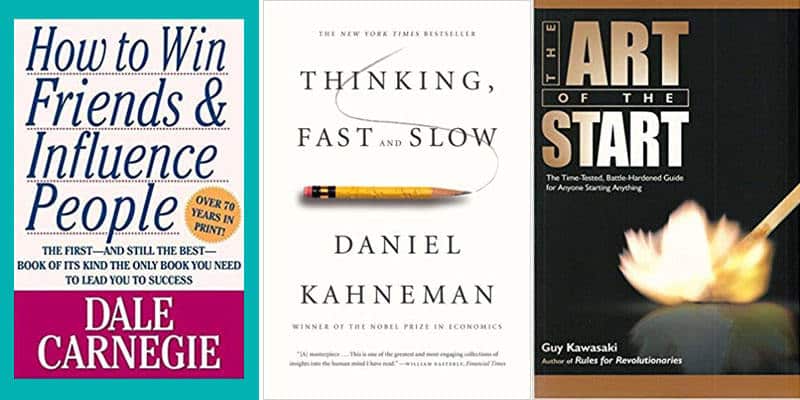The 7 Books Every Entrepreneur Should Read

If you’re looking for advice as an entrepreneur, you don’t often have to look for long. There are endless websites, seminars, conferences, podcasts, and books out there that promise to make you a more successful small business owner. The real challenge isn’t finding advice, it’s parsing out the good from the bad.
You definitely don’t have time to read every book out there geared toward business owners, but to broaden your horizons and find new inspiration, try to set a goal of at least a book a month. If you’re looking for a good place to start, here are seven books that every entrepreneur should read. Some are timeless classics that have sold millions of copies, while others are newer and more uniquely suited to address contemporary challenges entrepreneurs face.
1. How to Win Friends and Influence People by Dale Carnegie.
Every list of the best books for entrepreneurs should start with Carnegie’s seminal title, How to Win Friends and Influence People. First published in 1926, Carnegie’s book has sold 15 million copies worldwide, which makes it one of the all-time bestsellers. How to Win Friends provides helpful tips on how people can influence the perceptions of others—both in friendship and in business.
If you’re going to start reading about becoming a better entrepreneur, this is the book to begin with. You’ll learn how to help foster meaningful conversations with others, avoid unnecessary disagreements, and to forge genuine relationships with those around you. Carnegie laid down the foundation upon which nearly every other book of its kind is modeled. There’s a reason it’s still one of the most popular books in the genre, 92 years after publication.
How to Win Friends and Influence People Quotes:
- “Don’t be afraid of enemies who attack you. Be afraid of the friends who flatter you.”
- “You can make more friends in two months by becoming interested in other people than you can in two years by trying to get other people interested in you.”
- “It isn’t what you have or who you are or where you are or what you are doing that makes you happy or unhappy. It is what you think about it.”
- “Any fool can criticize, complain, and condemn—and most fools do. But it takes character and self-control to be understanding and forgiving.”
2. Thinking, Fast and Slow by Daniel Kahneman.
Carnegie may have shaped the blueprint for forging relationships with the outside world, but Kahneman’s research sheds light on how our thought processes shape our understanding of it. Nobel laureate Daniel Kahneman is best known for his work in behavioral economics, which studies the ways in which our own psychology and emotions impact the otherwise quantitative decisions we make every day.
Thinking, Fast and Slow describes how our minds process and act on thoughts. Kahneman suggests that the first system makes fast decisions based on emotion and instinct, whereas the second system is slower, more deliberate, and relies on more factors before making a decision. The mix of these two functions, as well as our own ability to bypass the first system’s reactions, can help us make better, more informed decisions over the long run. This is a great asset for entrepreneurs to control, as it help reduce the number of fear-induced decisions they make as they start their own ventures.
3. The Lean Startup: How Today’s Entrepreneurs Use Continuous Innovation to Create Radically Successful Businesses by Eric Ries.
Ries’ The Lean Startup is considered a canonical work in Silicon Valley. Successful startups like Dropbox and Wealthfront, as well as established companies like Intuit and Toyota, have put Ries’ method into practice to help scale their success quickly through shortened product development cycles and better insights into their customers’ needs.
The Lean Startup offers a set of principles about how businesses can eliminate wasteful practices and focus instead on those that produce value, all while companies are in their early stages. Ries’ method can help entrepreneurs of any stripe build their companies’ development processes in a way that’s responsive, quick, and efficient.
4. The Art of the Start: The Time-Tested, Battle-Hardened Guide for Anyone Starting Anything by Guy Kawasaki.
Guy Kawasaki is a marketing specialist, Silicon Valley venture capitalist, and was the marketing mind behind Apple’s Macintosh computer line in the mid-1980s. His book, The Art of the Start, offers wisdom about how any entrepreneur can take an idea and turn it into a viable business opportunity. Kawasaki’s sometimes-unconventional approaches, as well as his insights from a lifetime of entrepreneurial endeavors, helps influence his method of getting and kind of venture off the ground.
If you want to figure out how to identify your customer base, write a business plan, build brand identity, or identify new business partnerships, The Art of the Start is for you. He blends common-sense practices with bold thinking, making this a great read for the budding entrepreneur and seasoned business maven alike.
5. Orbiting the Giant Hairball: A Corporate Fool’s Guide to Surviving with Grace by Gordon A. Mackenzie.
Mackenzie’s Orbiting the Giant Hairball may not seem to be a must-read for entrepreneurs, but its insights into the ways of corporate America offer invaluable insights for those who decide to go it alone with their own companies. This book delves into the kinds of patterns and behaviors that even the most creative companies find themselves stuck in, be they bureaucratic procedures or traditions that no longer work.
Orbiting the Giant Hairball serves as a warning for entrepreneurs: Focus on company culture, or fall prey to patterns that hinder your performance. Even the smartest, leanest, and most innovative companies are at risk of resting on their laurels. Mackenzie offers guidance on how to avoid these common mistakes and focus on what keeps your company ready for whatever comes next.
6. Freelance to Freedom: The Roadmap for Creating a Side Business to Achieve Financial, Time and Life Freedom by Vincent Pugliese.
Most entrepreneurs first begin their companies as side hustles, second jobs, or as part-time work done alongside their “day jobs.” Taking a side business and turning it into a full-time job is no small feat—even if it’s every entrepreneurs’ dream. Pugliese’s career path is no different. After years spent in a low-paying job in the newspaper business, he opted to begin his own business out of desperation. But with the right approach, Pugliese took a small freelance business and turned it into a self-sustaining enterprise; one that allowed him to become his own boss and take control of his family’s financial freedom.
Freelance to Freedom provides a roadmap for entrepreneurs who want to take their side business and make it into a viable, full-time occupation. This book is invaluable in an age where freelance work is becoming the norm for many. His anecdotes, insights, and advice can help anyone take their idea for a small business and turn it into a self-sustaining enterprise.
7. Deep Work: Rules for Focused Success in a Distracted World by Cal Newport.
Running your own business can mean juggling several tasks at once, and not having anyone at the ready to help you pick up the slack. There are bills to pay, new clients to woo, invoices to file, and tons of other tasks that invariably end up on your shoulders. Tuning out these nagging notifications in a multitasking world can seem difficult, if not impossible. That’s where Newport’s Deep Work comes in.
Deep Work provides a method of working on tasks without distractions getting in the way. Through the deep work method, entrepreneurs can learn how to turn down the volume on the distractions that keep us all from working more efficiently and effectively. This is a must-read for any entrepreneur endeavoring on his or her own small business, as it provides an outline for tackling the endless tasks of running a business (without running out of sanity in the process).
No matter which books you choose, the most important thing is to develop a lifelong reading habit. Don’t just stop at business books, either. Sometimes, the best piece of advice or the kernel of a million-dollar idea comes from unlikely sources. Read across the gamut of genres, including fiction, non-fiction, poetry, and any other kind of book that tickles you into your diet. Just as we need to eat a balanced diet to stay healthy, we have to take in a balanced diet of literature to keep our minds fresh and open for whatever comes next.
Bring the best of the CEOWORLD magazine's global journalism to audiences in the United States and around the world. - Add CEOWORLD magazine to your Google News feed.
Follow CEOWORLD magazine headlines on: Google News, LinkedIn, Twitter, and Facebook.
Copyright 2025 The CEOWORLD magazine. All rights reserved. This material (and any extract from it) must not be copied, redistributed or placed on any website, without CEOWORLD magazine' prior written consent. For media queries, please contact: info@ceoworld.biz











